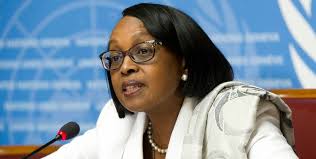By Asma’u Ahmad
The World Health Organisation (WHO) in Africa, says it has launched an online portal to allow health ministries in the region access data on Neglected Tropical Diseases (NTDs) and provide interventions were needed.
WHO Regional Director for Africa, Dr Matshidiso Moeti in a statement issued in Abuja on Tuesday, said the portal would provide access to data on five most prevalent NTDs that respond to preventive chemotherapy.
Moeti said that the portal was created and designed to help countries meet the UN’s sustainable development goal 3.3, which aims to achieve NTD elimination by 2030.
She said that the user friendly platform would also provide accurate pictures of NTD prevalence across each country enabling national NTD programmes make informed decisions and distribute resources most efficiently.
She said that with 39 per cent out of the 1.58 billion people globally affected by NTDs living in Africa, evidence-based decision making against the disease had become crucial to achieve progress.
“The World Health Organisation Regional Office for Africa has launched a new and improved version of its online portal, providing better access to more detailed country-specific data relating to Neglected Tropical Diseases (NTDs) across Africa.
“Through the Expanded Special Project for Elimination of NTDs (ESPEN), the WHO Regional Office for Africa was able to make several improvements to its online portal.
“This user-friendly platform allows Ministries of Health and other users to access data on NTDs on a sub-national level identify specific areas where interventions are needed most.
“The in-depth, sub-national data provides an accurate picture of NTD prevalence across each country, enabling national NTD programs to make better-informed decisions and distribute resources most efficiently.
“Specifically, the ESPEN portal provides access to data on the five most prevalent NTDs that respond to preventive chemotherapy (PC-NTDs).
Today, NTDs affect 1.58 billion people globally 39 per cent of whom live in Africa.
“These diseases are both preventable and treatable, yet they continue to cause severe disfigurement and other long-term disabilities that create obstacles to education, employment, economic growth and overall development,” Moeti said.
The regional director said that the portal would offer access to new interactive maps from 48 countries and downloadable date from 44 countries including annual reports, country master plans and epidemiology.
She said that the development would enable health ministries and stakeholders share data in order to accelerate the elimination of NTDs such as schistosomiasis, soil-transmitted helminthiasis, Trachoma, Lymphatic Filariasis and river blindness.
Dr Maria Polo, the ESPEN Team Leader at the WHO Regional Office Africa, stressed how critical it was for countries to do more to combat the variety NTDs that were sadly still very prevalent across Africa.
Polo said that this was causing citizens in the region severe disabilities and sometimes their lives.
According to her, access to updated and more accurate data is vital for countries to implement strategic plans that could truly help to save lives and eliminate NTDs.
She urged NTD elimination programmes across Africa to utilise this innovative tool so that their research and investments result achieve real impact and help to manage scarce resources.
The statement said that ESPEN was a WHO project created in the spirit of a public-private partnership with the ultimate goal of accelerating the elimination of five PC-NTDs in Africa.
Since its launch in May 2016, ESPEN works with domestic and international partners to leverage on the $17.8 billion in drug donations from pharmaceutical companies to expand coverage and access to treatments.
The donation is also aimed at strengthening health systems and providing Universal Health Coverage of interventions against PC-NTDs in Africa until the final elimination of the disease is achieved.



